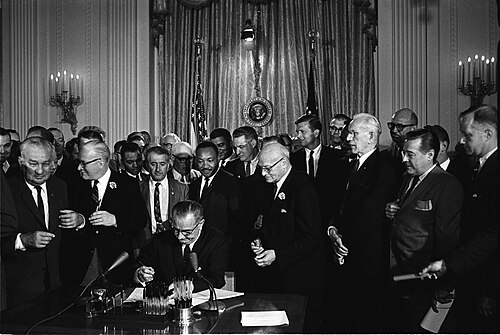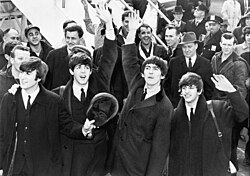Portal:1960s
The 1960s Portal
The 1960s became synonymous with the new, radical, and subversive events and trends of the period. In Africa the 1960s was a period of radical political change as 32 countries gained independence from their European colonial rulers. Some commentators have seen in this era a classical Jungian nightmare cycle, where a rigid culture, unable to contain the demands for greater individual freedom, broke free of the social constraints of the previous age through extreme deviation from the norm. Christopher Booker charts the rise, success, fall/nightmare and explosion in the London scene of the 1960s. However, this alone does not explain the mass nature of the phenomenon. Several nations such as the U.S., France, Germany and Britain turned to the left in the early and mid 1960s. In the United States, John F. Kennedy, a Keynesian and staunch anti-communist, pushed for social reforms. His assassination in 1963 was a stunning shock. Liberal reforms were finally passed under Lyndon B. Johnson including civil rights for African Americans and healthcare for the elderly and the poor. Despite his large-scale Great Society programs, Johnson was increasingly reviled by the New Left at home and abroad. The heavy-handed American role in the Vietnam War outraged student protestors across the globe, as they found peasant rebellion typified by Ho Chi Minh and Che Guevara more appealing. Italy formed its first left-of-center government in March 1962 with a coalition of Christian Democrats, Social Democrats, and moderate Republicans. Socialists joined the ruling block in December 1963. In Britain, the Labour Party gained power in 1964. In Brazil, João Goulart became president after Jânio Quadros resigned. This is a Featured article, which represents some of the best content on English Wikipedia..
The Voting Rights Act of 1965 is a landmark piece of federal legislation in the United States that prohibits racial discrimination in voting. It was signed into law by President Lyndon B. Johnson during the height of the civil rights movement on August 6, 1965, and Congress later amended the Act five times to expand its protections. Designed to enforce the voting rights protected by the Fourteenth and Fifteenth Amendments to the United States Constitution, the Act sought to secure the right to vote for racial minorities throughout the country, especially in the South. According to the U.S. Department of Justice, the Act is considered to be the most effective piece of federal civil rights legislation ever enacted in the country. The National Archives and Records Administration stated: "The Voting Rights Act of 1965 was the most significant statutory change in the relationship between the federal and state governments in the area of voting since the Reconstruction period following the Civil War". The act contains numerous provisions that regulate elections. The act's "general provisions" provide nationwide protections for voting rights. Section 2 is a general provision that prohibits state and local government from imposing any voting rule that "results in the denial or abridgement of the right of any citizen to vote on account of race or color" or membership in a language minority group. Other general provisions specifically outlaw literacy tests and similar devices that were historically used to disenfranchise racial minorities. The act also contains "special provisions" that apply to only certain jurisdictions. A core special provision is the Section 5 preclearance requirement, which prohibited certain jurisdictions from implementing any change affecting voting without first receiving confirmation from the U.S. attorney general or the U.S. District Court for D.C. that the change does not discriminate against protected minorities. Another special provision requires jurisdictions containing significant language minority populations to provide bilingual ballots and other election materials. (Full article...) This is a Good article, an article that meets a core set of high editorial standards.
Hurricane Debbie was an intense and long-lived hurricane that formed during August 1969. The fifth tropical cyclone, fourth named storm, third hurricane and second major hurricane of the 1969 Atlantic hurricane season, Debbie formed on August 14 in the southern Atlantic Ocean and took a general northwesterly path until turning northward into the central Atlantic. The storm was characterized by numerous fluctuations in intensity, but it still reached winds corresponding to Category 3 status on the Saffir–Simpson scale. The hurricane bypassed the island of Bermuda to the southeast on August 22, before ultimately brushing southeastern Newfoundland with strong winds. It dissipated over the cold waters east of Greenland. Although Debbie had little effect on land, it was extensively researched and was subject to a weather modification experiment by Project Stormfury, in which it was seeded with silver iodide. (Full article...) Selected picture - United States President Lyndon B. Johnson (seated) signs the Civil Rights Act of 1964, a landmark piece of legislation that outlawed racial segregation in schools, public places, and employment. Among the guests behind him is Martin Luther King Jr. (directly behind and to the right of Johnson).
Did you know -
Related portalsThis is a Featured article, which represents some of the best content on English Wikipedia..
Peter Sellers (born Richard Henry Sellers; 8 September 1925 – 24 July 1980) was an English actor and comedian. He first came to prominence performing in the BBC Radio comedy series The Goon Show. Sellers featured on a number of hit comic songs, and became known to a worldwide audience through his many film roles, among them Chief Inspector Clouseau in The Pink Panther series. Born in Southsea, Sellers made his stage debut at the Kings Theatre, Southsea, when he was two weeks old. He began accompanying his parents in a variety act that toured the provincial theatres. He first worked as a drummer and toured around England as a member of the Entertainments National Service Association (ENSA). He developed his mimicry and improvisational skills during a spell in Ralph Reader's wartime Gang Show entertainment troupe, which toured Britain and the Far East. After the war, Sellers made his radio debut in ShowTime, and eventually became a regular performer on various BBC Radio shows. During the early 1950s, Sellers, along with Spike Milligan, Harry Secombe and Michael Bentine, took part in the successful radio series The Goon Show, which ended in 1960. (Full article...) This is a Good article, an article that meets a core set of high editorial standards.
Stanley Kubrick (/ˈkuːbrɪk/; July 26, 1928 – March 7, 1999) was an American filmmaker and photographer. Widely considered one of the greatest filmmakers of all time, his films were nearly all film adaptations of novels or short stories, spanning a number of genres and gaining recognition for their intense attention to detail, innovative cinematography, extensive set design, and dark humor. Born in New York City, Kubrick was an average school student but displayed a keen interest in literature, photography, and film from a young age; he began to teach himself film producing and directing after graduating from high school. After working as a photographer for Look magazine in the late 1940s and early 1950s, he began making low-budget short films and made his first major Hollywood film, The Killing, for United Artists in 1956. This was followed by two collaborations with Kirk Douglas: the anti-war film Paths of Glory (1957) and the historical epic film Spartacus (1960). (Full article...) Selected article -On the evening of August 4, 1962, American actress Marilyn Monroe died at age 36 of a barbiturate overdose inside her home at 12305 Fifth Helena Drive in Brentwood, Los Angeles, California. Her body was discovered before dawn the following morning, on August 5. Monroe had been one of the most popular Hollywood stars during the 1950s and early 1960s, and was a top-billed actress for the preceding decade. Her films had grossed $200 million by the time of her death. Monroe had suffered from mental illness and substance abuse, and she had not completed a film since The Misfits, released on February 1, 1961, which was a box-office disappointment. Monroe had spent 1961 preoccupied with her various health problems, and in April 1962 had begun filming Something's Got to Give for 20th Century Fox, but the studio fired her in early June. Fox publicly blamed Monroe for the production's problems, and in the weeks preceding her death she had attempted to repair her public image by giving several interviews to high-profile publications. She also began negotiations with Fox on being re-hired for Something's Got to Give and for starring roles in other productions. (Full article...) More Did you know (auto generated)
TopicsCategoriesWikiProjects
Associated WikimediaThe following Wikimedia Foundation sister projects provide more on this subject:
Discover Wikipedia using portals |






























